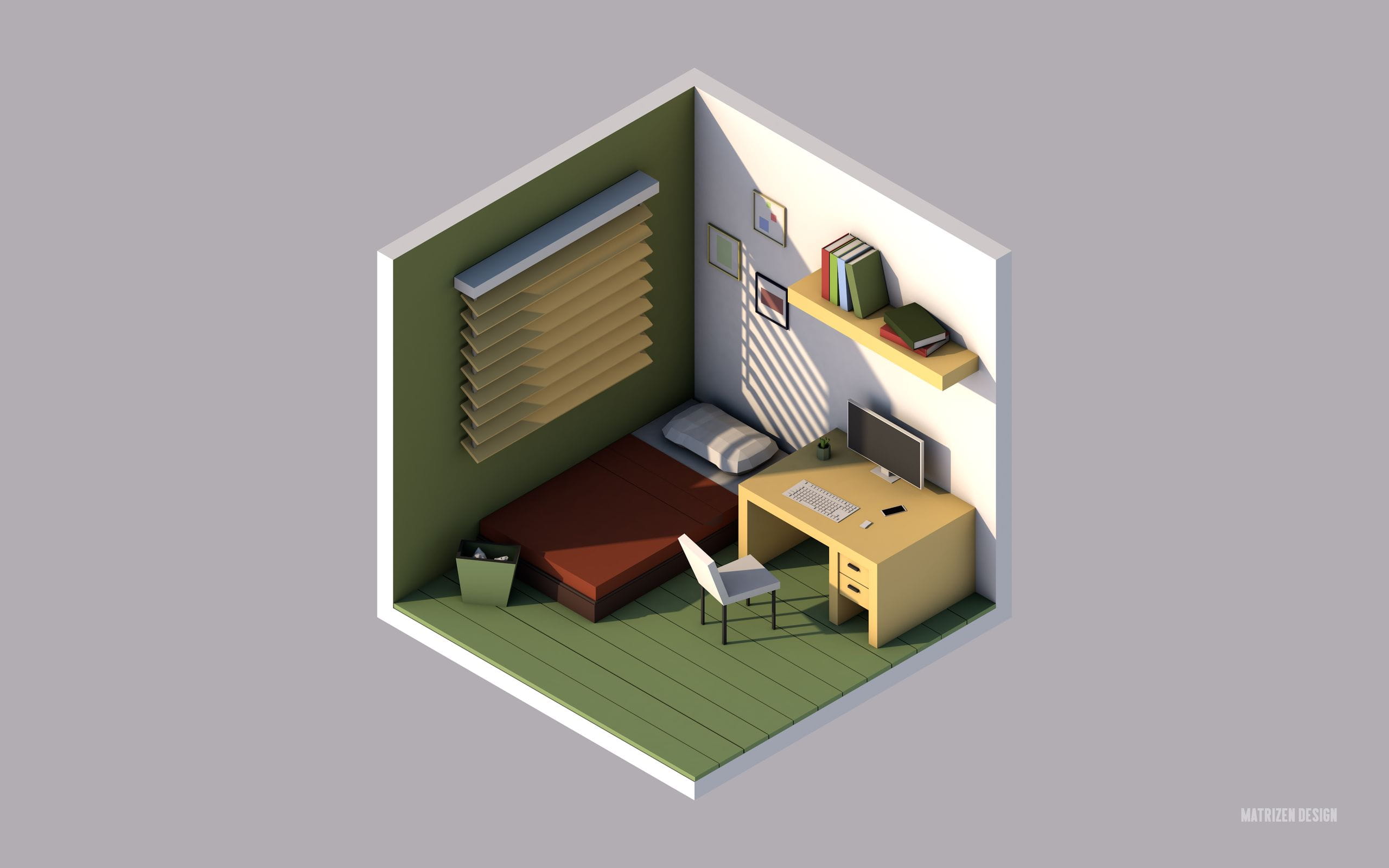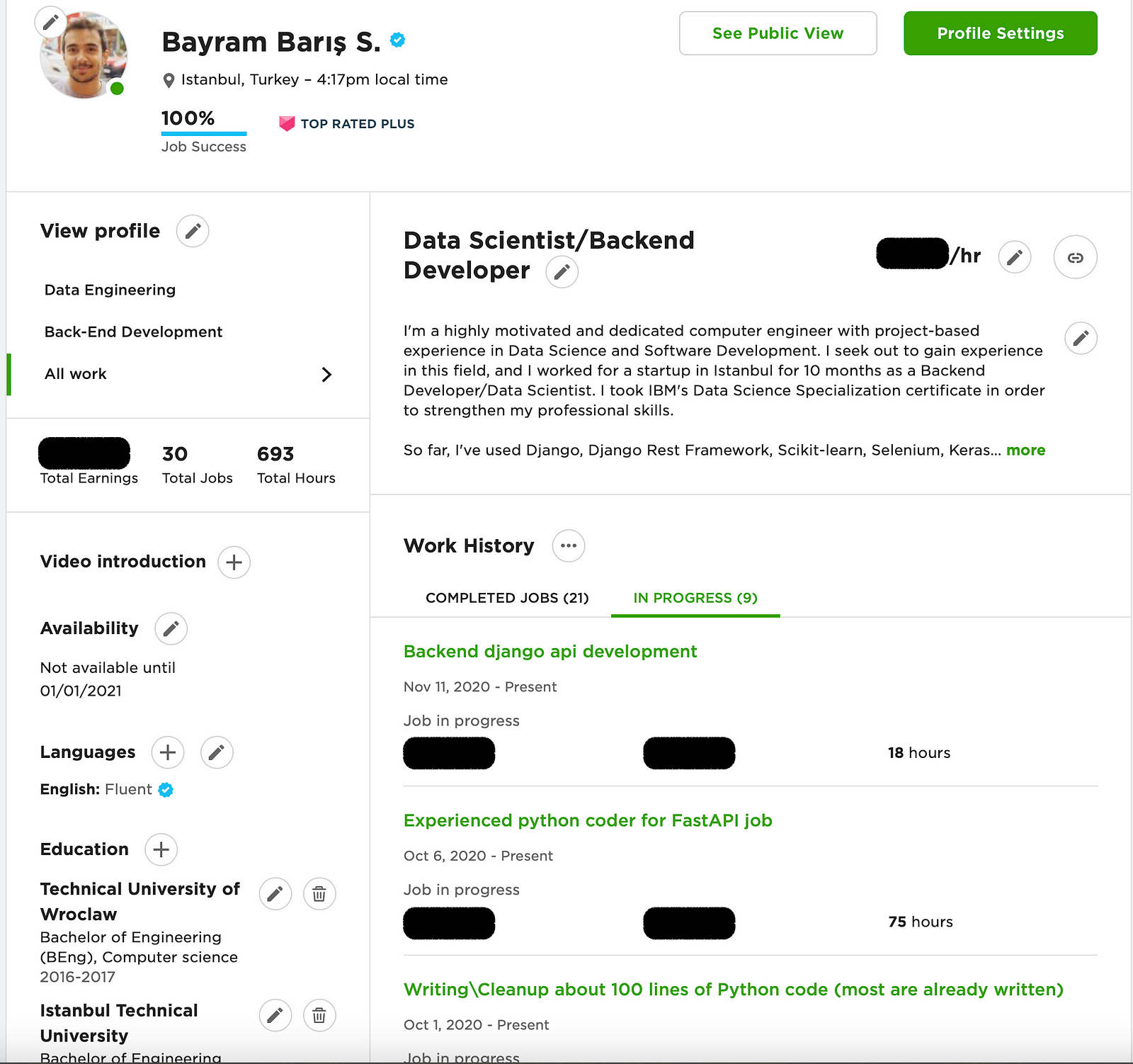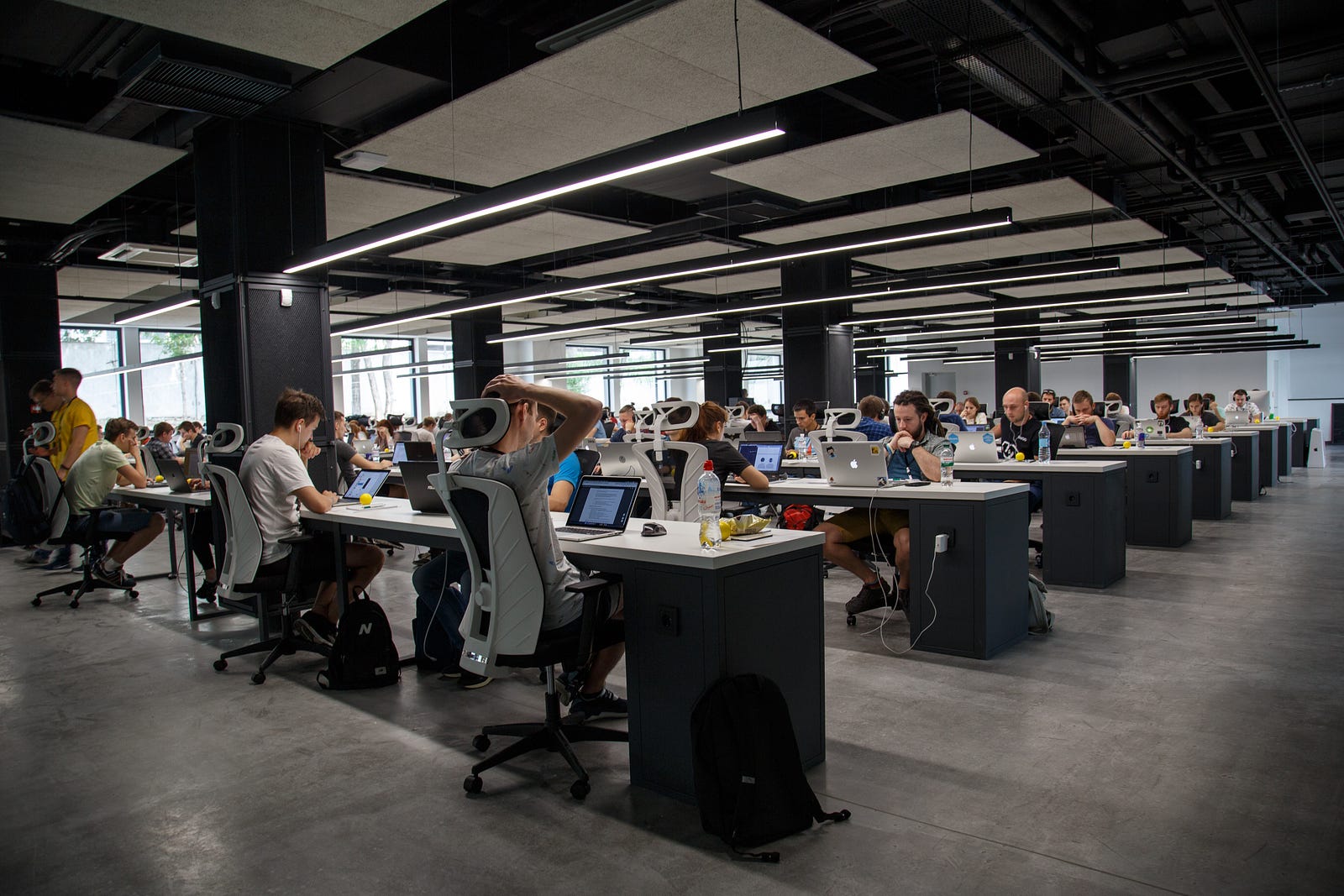
Photo by Matrizen Design on Wallhaven.cc
Why freelance suits me more?
You can read this article on Medium or Linkedin as well.
About Me
My work history
I’m a computer engineer graduate who started his working life in January 2019 (or October 2018 if the two months internship does count). I was a lucky employee because I had flexible working hours. I could go to work between 8 to 10 am and finish the day between 5 to 7 pm. I love sleeping, and therefore, I always preferred to start at 10 am. I had a chance to have a lazy morning routine. Work was not far away from home (~40–50 mins, which counts close in Istanbul!), I was reading articles and books during the commute. I loved my company and my colleagues, but I only worked on this job for ten months! So, you are probably asking what happened? The reason I left is I had accepted another on-site work in Belgium (which had always been one of my plans: to live and work in Europe).
During my spare time, I was getting a bit bored because my university projects and exams were outweighing the workload I had in a full-time job! So, I decided to take on some side freelance projects. I had an inactive account on one of the most popular freelancer platforms. I updated my account and started to apply for small projects. I had accepted to two projects in one week, and that’s how my freelance journey started. After delivering these projects successfully, my profile got more reputation bit by bit and it has become simpler each day to find another project to work. Yet, I still had a full-time job. I had a limited time for freelance work. So, I kept the speed low until I left my full-time job in November 2019.
I was planning to move to Belgium in the middle of January 2020. According to plan, I had 2.5 months to save some money, visit all friends & family, and complete procedures to move in. I didn’t want to stop working, and I said to myself: “Let’s try to get a freelance job which is nearly full-time”. I talked with my previous clients and applied for new jobs. Just after the day I had quit, I got accepted to freelance work. It made me feel great. I never thought this transition would be so smooth. While I was waiting for my residence permit (it took more than 2.5 months), the pandemic has spread all around the world. So, here I am. I have been working as a freelancer since November 2019.
 My profile on the freelance platform
My profile on the freelance platform
My specialization
You might want to ask my positions in the jobs I mentioned above. I could describe it as Backend Developer (in most) and Data Scientist (in minor). I have often used Python in my tasks.
As of now, I would say I’m a Software Developer who loves Python a lot. I have used it for networking, backend, automation, machine learning/deep learning and many more subjects. But it doesn’t mean that I only use Python. I have used JS (jQuery and Vue.js), Go, Matlab when necessary.
Freelance vs Permanent on-site Jobs
Advantages and drawbacks of on-site jobs

I would like to inform you that I tried to consider both startups and big tech companies in Turkey when I write these advantages and drawbacks. I tried to combine all my personal and my friends’ memories to make it more general.
Here are my subjective observations & thoughts:
Advantages
- You have a steady job. You don’t need to pursue to get a new project once your freelance contract finishes. You don’t need to do your marketing, etc.
- It is easier socializing with your colleagues even though you’re in different departments.
- People might be easily distracted when they’re in a cafe or home. But when your colleagues who work surround you, it will be less for sure.
- If you like routines, you might get a job in which you will do almost the same things for years. You don’t need to worry about improving yourself. You might spend your whole energy in other parts of your life.
- Communication is a lot easier. For example, you don’t need to wait for a meeting or reply to your messages/emails. You can directly ask it during lunchtime.
Drawbacks
- We’re human, not machines. I haven’t seen or heard anyone in my life who says he/she works efficiently in the 8 hours of a workday and 40 hours in a week. I don’t think it’s possible yet that’s the most prevalent working style. Unfortunately, most of the jobs can’t offer other employment types but on-site. I hope it might somehow change as pandemic has already forced us to think about the remote working.
- I’m not fond of working on desks, I never have been. I had always worked on a couch lying down, notebook on my lap. It makes many people sleepy but not me! So, when I sit in front of a desk and work for an 8 hour, I don’t think I can give an A+ grade performance. It is like using your snow tires in the summer and saying that it should have given a better performance.
- Hierarchy and bureaucracy. It kills your motivation to ask your IT department to enable Python in your laptop and wait for days! Or it could be even worse. Once, it took me two days to create an account! I couldn’t even log in to the system. So, I had nothing to do but wait. (This is also changing in these days, many companies support flat hierarchy, create small and efficient agile teams, etc.)
- You have a contract, and you probably have a detailed description of your job. Yet, in Turkey, you might be in a position where you work on entirely different subjects because your project manager asks for it. It’s one of the main reasons that made me disillusioned in on-site work for a company.
- The hiring process is killing the motivation because it is too long! (especially for the new graduates). You have a phone call, you pass a test, you make an interview with HR, you make an interview with department&project managers, you make an interview with CEO/CTO, then finally you get an offer or get rejected. It sometimes takes months!
- Your career path might suffer damage depending on your company’s vision. If it doesn’t offer you to use state-of-the-art technologies, you can’t use them. So, you might work for full-time using a dying old technology, which doesn’t help at all to improve your skills.
Advantages and drawbacks of freelance jobs

Again, please note that these are my subjective observations & thoughts:
Advantages
- You can contribute to a few projects at the same time. I’m a person who hates routines! (When I start to do something I’ve done before, I feel like it shouldn’t be necessary to repeat myself. There is something wrong. When I say routines, I don’t mean to use the same technologies, some frameworks, libraries etc. Of course, you should use them if you think they’re robust. What I mean is as follows: I don’t want to work on similar tasks repeatedly. Or I don’t want to revise the same code again and again because the lack of review/resources etc. . However, I love both data-related tasks and Web Development (I have started to like frontend development, too!). So, I’m working as a part-time freelancer for a few different projects where I have to use them. It helps me to get out of my comfort zone. It always pushes my boundaries because I need to keep myself up-to-date in each technology I use. And there aren’t only one thanks to each project I work.
- You’re the boss. If you don’t want to be committed to a long term project, you may apply to short-term projects. If you would like to work as a regular full-time job, you can seek for projects that take more than a year or so. That’s your decision.
- You will not work on tasks you don’t like. In freelance jobs, clients are hiring you by considering your specialization and their needs. If that doesn’t fit, you don’t make a contract. You both continue your ways. So, you don’t learn that the job is not for you after the hire. If it somehow occurs, it is easier to terminate your contract.
- You select your working hours in most of the freelance jobs. So, if you don’t feel like working in the morning, you could start in mid-day. If you’re a night-bird, you can only work on night hours.
- You might earn lots more than your full-time job. Hourly rates are higher than a regular job because clients pay fewer taxes. They also don’t pay for insurance, etc. That’s why they offer you more than a regular job. (For example, my hourly rate is eight times more than my regular job at the moment)
- The hiring process is blazingly fast! You don’t need to wait for weeks to get an answer from HR. You usually directly contact with the project manager, business owner. So, it takes only one interview (or a few days) instead of interviews spread to weeks.
- There is no commute time. It means you have extra time for your hobbies, for your friends & family.
- You can work from anywhere as long as you have a laptop and have a good internet connection. I love travelling a lot. Even though I couldn’t go anywhere in 2020 because of pandemic :/, I have plans to travel around the world. I also love my profession, and I would like to continue my work when I travel. I might be a digital nomad eventually. We will see.
- It is more transparent than most of the companies! There are no backdoor talks, ego-wars between employees, racing for a better role, etc. In almost all of the time, you’re in a flat group of people. You don’t think of promotion because you agree on a price clearly from the beginning.
Drawbacks
- Communication might be challenging from time to time. I have got involved in projects where there were people from the UK, Canada, US, Australia, South Africa, Germany so far. It means that I’m not in the same timezone with any of them. What we do is we talk asynchronously.
- It is difficult to get a job if you’re inexperienced. Freelance jobs don’t support the intern-employee relationship. Most of the clients look for a talented developer who has already proved himself/herself.
- It might be overwhelming to prove yourself in each time you join a new project. You’re in a new community, and nobody knows you. Your profile would be breathtaking. But do you worth to be paid? Of course, your new client and colleagues will evaluate your skills and ask this question. You should prove yourself.
- You don’t socialize much. If you’re working freelance for a company, you’re not a member of a company. So, it is not the same. You don’t connect with employees. You usually don’t have a communication channel but the other freelancers and project managers. If you’re a freelance team, it’s more like employee relationship. However, again, you don’t see each other. When a project delivered, you may never talk with them again.
If you ask me whether I’m doing anything to get rid of the drawbacks of freelance working, I’d say yes. I’m working with long-term clients, and I work with the same teams for months & years. I’m clearly stating the timezone I live in, in which hours I usually work, so we arrange our talks & meetings according to that.
I would like to finish this section with my career decisions. I didn’t have an idea to work freelance for living until March/April 2020. I was working freelance since November but I was thinking to switch to a new permanent job in Belgium. This plan cancelled in March. Then, I have contemplated my freelance job decision a lot. I asked myself:
- “Am I happy now or was it better when I was a permanent employee for a company”
- “Do I find more free time to spend on other things or is it still the same?”
- “Do I feel like I’m getting paid what I deserve or not?”
- “Would my thoughts be the same if there wasn’t a pandemic?”
- “Do I improve myself; do I work on the projects I liked?”
When I checked the answers, the decision was already made :)
Conclusion
They both have advantages and drawbacks as you already expected. I am pleased to have an opportunity to work remotely as a freelancer. I also genuinely believe that remote work is not for everyone. Lots of people were saying that working from home is the thing they asked at the beginning of the pandemic. Their ideas have changed after a few months because this working style does not suit everyone. Drawbacks might affect them far more than it affects me. For me, it has lots of privileges. Therefore, I had been already working from home when the pandemic started. And I’m continuing my freelance works still.
I hope this article helps some people who want to understand if they want to work freelance or not.
Notes
- Please keep in mind that remote work and freelance work are not the same. I didn’t want to dive into the explanation of employment types. And I hope you will understand this comparison correctly. I compared on-site permanent employees with freelancers (independent contractors).
Thanks a lot for reading until here! You have read my very first article. I’m looking forward to hearing your suggestions and feedback.

